In Memoriam
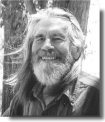
Martin Murie |
"In a place of enchantment where the wild things are known
Will the future remember when the lovers are gone?"
John Denver, A Song for All Lovers
(Swans - February 13, 2012) You know how it feels when you hear or read that yet another giant 800-year-old majestic redwood tree has just been felled in the name of consumerism and profits, inflicting a permanent scar on Nature, on Mother Earth, don't you? Anger comes to mind, anger at a materialistic socioeconomic system bent on destruction to satisfy greed -- though one hopes this negative sentiment will be quickly rejected and replaced by a sense of loss and sorrow, and a renewed, reinforced call to action. Leaving rage aside, this is exactly how I reacted when Jim Stiles, the publisher and editor of the Canyon Country Zephyr, sent me an e-mail to announce that another majestic giant had fallen. Martin Murie, who has graced our pages 89 times over the years, died on January 28, 2012. He was 86 years old.
Words fail me to draw a full color palette in order to paint Martin's rainbow or the multiple pieces of the humane kaleidoscope he was. It's not simply a tapestry one must weave, but a quilt with each square representing a part of his personality and being. Martin was a naturalist, a zoologist, a conservationist, an unrepentant environmentalist, a fervent antiwar veteran, a political activist, a novelist, a columnist, a teacher, a philosopher, an artist, a great conversationalist who loved to listen to the Other, a contrarian, and above all a devotee of wilderness, living on the fringe of society. Talk about a quilt!
Martin was born in 1925 in a small hamlet in the far north...Alaska. He was not even a year old when his mother took him on a four-month journey along an arctic river where his father conducted a field trip for the US Bureau of Biological Survey (now the US Fish and Wildlife Service). One year later, his father received a new assignment from the Bureau to study elks in Wyoming. The family moved to Jackson Hole where Martin spent his childhood and where his sister Joanne (1927) and brother Donald (1931) were born.
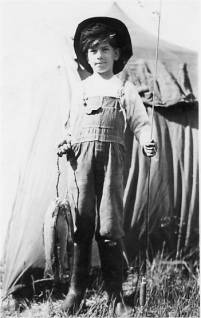
Martin and fishes |
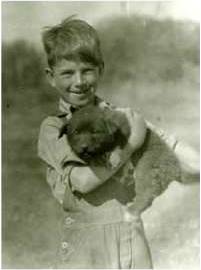
Martin and his dog |
When the U.S. entered WWII, Martin answered the call to duty. He joined the 10th mountain infantry of the US army and fought in the mountains of Italy where he was badly wounded and lost his right eye. He somehow made his way back to Wyoming. His parents and uncle had bought a 76-acre dude ranch near Moose, WY -- the STS Ranch, which is now part of Grand Teton National Park and the conservation's home of the Murie Center.
It must not have been easy to be the son of Olaus and Mardy Murie and the nephew of Adolph Murie, the founders of modern-day environmentalism and conservationism.
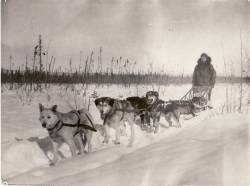
Olaus Murie |
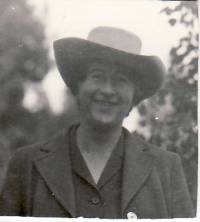
Mardy Murie |
But Martin went his own way. He studied literature and philosophy at Reed College in Portland, Oregon. Thanks to the GI Bill, he went on to UC Berkeley to study zoology and eventually earned his Ph.D. Time came to get a teaching position, but it was in the midst of the dreadful McCarthy witch-hunt. He was asked to sign a loyalty oath, which he refused to do on principle. I have no idea whether Martin was a communist -- I do not think so. He was too much of a freethinking independent to espouse any ideological chapel.
Unable to teach, Martin resorted to odd jobs like dealing with froggers -- no, not the Frenchies; the catchers of real frogs in the California central valley, hunters of our natural bounties. Nature, as always, was his calling one way or another.
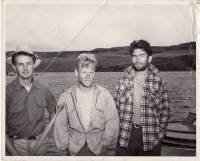
Martin and friends |
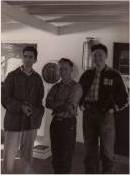
More friends |
He eventually did become a teacher, first at UC Berkeley, then UC Santa Barbara, and Antioch College in Yellow Springs, a small, liberal town in Ohio where he and his wife of sixty years, Alison, raised three daughters -- Raven, Norah, and Janet. He was teaching life sciences, but it was not his true calling. He missed wilderness. He missed Nature. He wanted to write and put his creative juices into social endeavors.
So he retired. He and Alison bought a piece of land in North Bangor, in the backwoods at the edge of the Adirondacks in New York State. There he built a cabin and farmed the land, used his body to do daily tasks. Whether it was cleaning the outside toilet, cutting and splitting wood, clearing snow, he was in his element -- and he was writing and standing for his deep antiwar convictions.
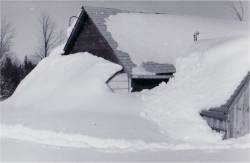
The Bangor cabin |
This was the penultimate chapter of his life. He wrote, lived in the wild, and he took action. In 1996, he published Losing Solitude, which became the headline of his bi-monthly column in the Canyon Country Zephyr. He subsequently wrote Windswept, Red Tree Mouse Chronicles, Seriously Insistent, Burt's Way, Breakout (reviewed in these pages), Lester and Me, and Desert Rats. (All of his books can be found at his Web site, packratnest.com.) His writing was about friendship, nature, and transience -- the simplicity of life and the love we all want to give and receive.
He wrote and gave everything he had in his heart and soul. Every weekend he attended an antiwar demo, rain or shine, always with a smile on his face. Still, somehow, I sense that his heart and soul never left the wonders of the north. There he always was, writing about it, especially the dear Jackson Hole of his childhood. There, he always wanted to be. There. Nostalgia of a time long bygone was an inherent thread in the refined tapestry.
Age took its toll. Martin could no longer take care of the farm. He and Alison left Bangor a few years ago and moved to Ohio where their three daughters live. They wanted to find a place in Yellow Springs but could not afford the price of real estate -- they were surviving on his monthly veteran's pension and Social Security checks. So they settled in Xenia, 8 miles away. And every Saturday they would drive those 8 miles to demonstrate against the insanity of war. His writing became sparser. He kept contributing to The Zephyr, at times with columns previously published elsewhere. And eventually the night fell, as it will with all of us.
Now, what I have just related about Martin may not be chronologically correct, or correct at all, pure and simple. It's just what I knew or believed I knew about him. But something I am quite confident of is that on January 28, 2012, a tender wind brought his soul all the way back to Jackson Hole.
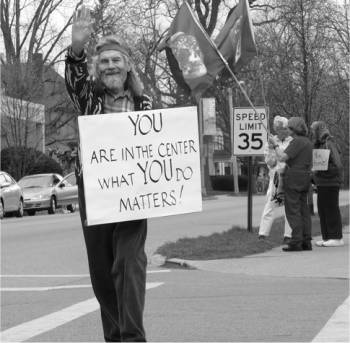
Always the anti-warrior |
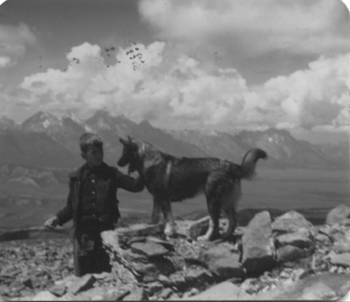
Always a lover of life |
What a gentle quilt this man created.
Martin Murie's work for Swans can be accessed in the yearly archives: 2006 || 2007 || 2008 || 2009 || 2010
[ed. All pictures courtesy of the late Martin Murie.]
If you find Gilles d'Aymery's article and the work of the Swans collective
valuable, please consider helping us
Legalese
Feel free to insert a link to this work on your Web site or to disseminate its URL on your favorite lists, quoting the first paragraph or providing a summary. However, DO NOT steal, scavenge, or repost this work on the Web or any electronic media. Inlining, mirroring, and framing are expressly prohibited. Pulp re-publishing is welcome -- please contact the publisher. This material is copyrighted, © Gilles d'Aymery 2012. All rights reserved.
Have your say
Do you wish to share your opinion? We invite your comments. E-mail the Editor. Please include your full name, address and phone number (the city, state/country where you reside is paramount information). When/if we publish your opinion we will only include your name, city, state, and country.
About the Author
Gilles d'Aymery on Swans -- with bio. He is Swans' publisher and co-editor. (back)
